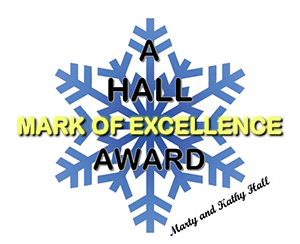 This coverage is made possible through the generous support of Marty and Kathy Hall and A Hall Mark of Excellence Award. To learn more about A Hall Mark of Excellence Award, or to learn how you can support FasterSkier’s coverage, please contact info@fasterskier.com.
This coverage is made possible through the generous support of Marty and Kathy Hall and A Hall Mark of Excellence Award. To learn more about A Hall Mark of Excellence Award, or to learn how you can support FasterSkier’s coverage, please contact info@fasterskier.com.
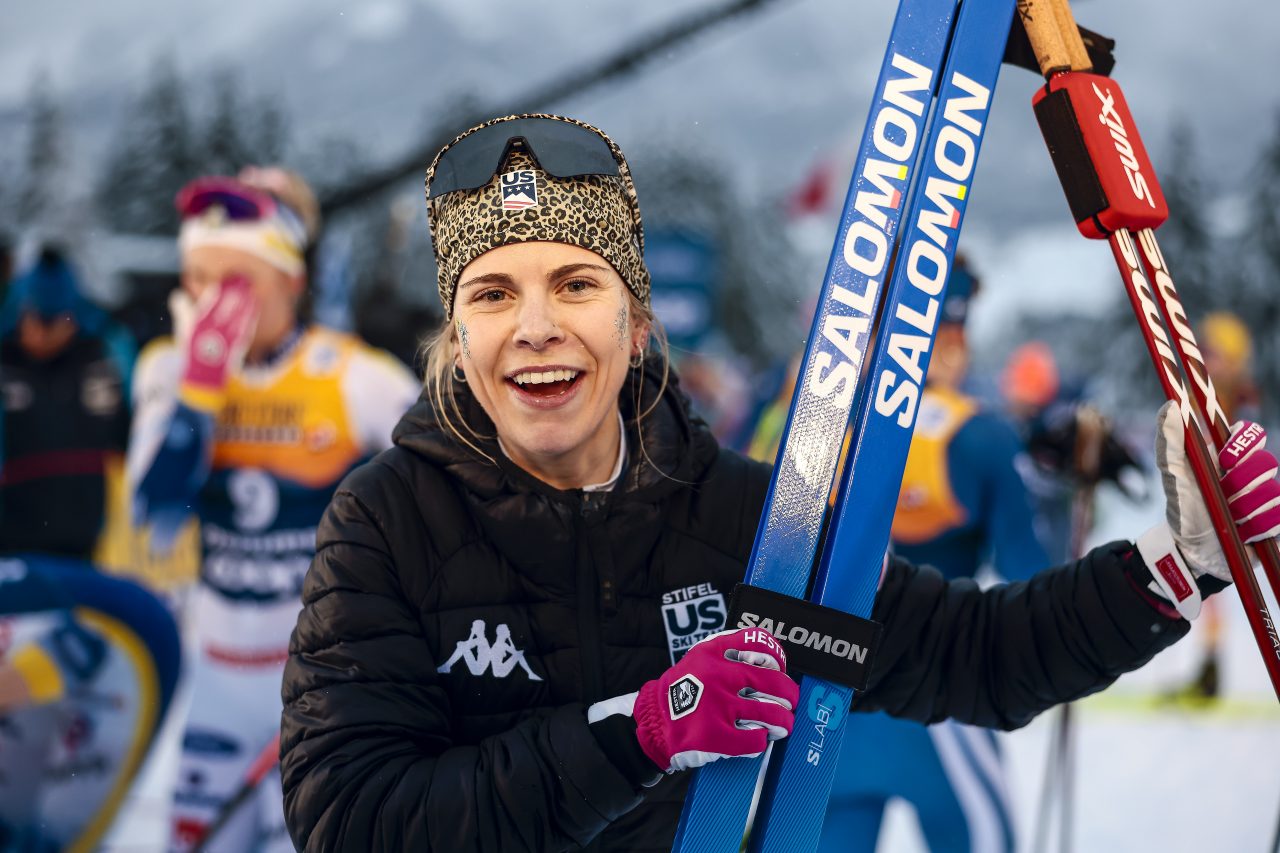
On the last day of the Tour de Ski, Stifel U.S. Ski Team member Sophia Laukli had a first-ever win in a World Cup race. She’s also on pace to have her best season as a professional skier. After the Tour de Ski, the 23 year old Laukli spoke to FasterSkier from her residence in Oslo, Norway. She shared her thoughts about her Tour, climbing Alpe Cermis, how her professional running career is affecting her skiing, and—what she admits are her weaknesses—Sprinting and Classic races.
This interview has been edited for length and clarity.
FasterSkier: Congratulations on completing the Tour. Now that it’s behind you and you’ve had a couple days to rest and look back, what’s your own self-assessment on how your Tour went for you?
Sophia Laukli: I’ve done [the Tour de Ski] three times now, and it always ends on a high note. I’ve always done well on the [Alpe Cermis], so it maybe skews my perception of the Tour. It was definitely up and down. Like many people, I had gotten sick right before Christmas with the flu, and so I had not had the prime lead-up with training. The first few races were definitely quite the suffer-fest, and I was very much debating if it was worth continuing. This year it was different because I was sick, but each year I’ve definitely had slower starts to the Tour. It’s easy to say that when a lot of the first races are Sprints and Classic races, which don’t suit me so well. But this year, I was mostly conflicted about going all the way through with the rest of the season in mind and what was going to be smart. But, I was eventually feeling better each race. And I was pretty psyched with the later Classic races. I’m definitely having much better results than normal in Classic races, and that was very motivating. So, I would say, halfway through the Tour I decided to continue and then it kind of all started falling into place. Davos was OK and then we got to Val de Fiemme and I definitely had some good results there. I don’t know if we’ll ever have a Tour de Ski where I don’t have a few hiccup races at the beginning, but yeah, it’s easy to say that it was a great Tour just because of the last day, but it was a bit of a roller coaster … like, most people have.
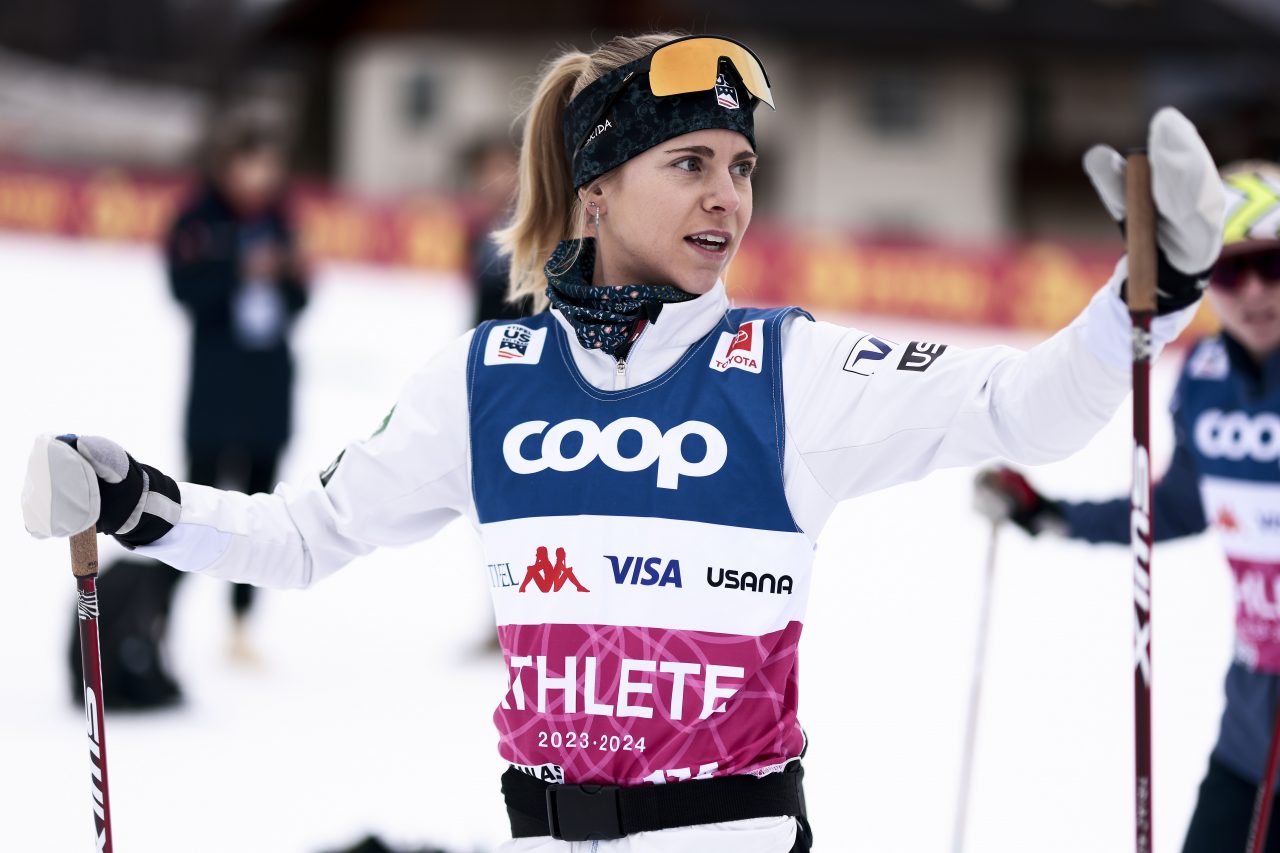
FasterSkier: Did your illness affect you all the way through the Tour?
Sophia Laukli: Whatever flu I had gotten really got to my lungs, and that was something I was worried about because with COVID this summer and last winter, I had some pretty gnarly comebacks from it affecting my lungs. So that was where I felt it most, and definitely in Toblach. Davos was the first race where I felt a bit more normal and kind of felt good enough to go to Val de Fiemme and just finish it. It’s a fine line deciding if racing is just going to put me more in the hole; in this case, it seemed to be helping me, or I was just feeling better each time.
FasterSkier: Since you brought up the Classic races, in Davos, several of the Swedish women decided to double pole the course. Given that striding isn’t your strongest asset, did you consider that approach?
Sophia Laukli: No, definitely not. When it comes to Classic skiing, striding is what I’m able to do and double pole is what I’m not.
FasterSkier: Now that the Tour is behind you and you can kind of pull illness out of the equation, do you have any ideas for over the summer: what you’re going to be focusing on as areas of growth for you?
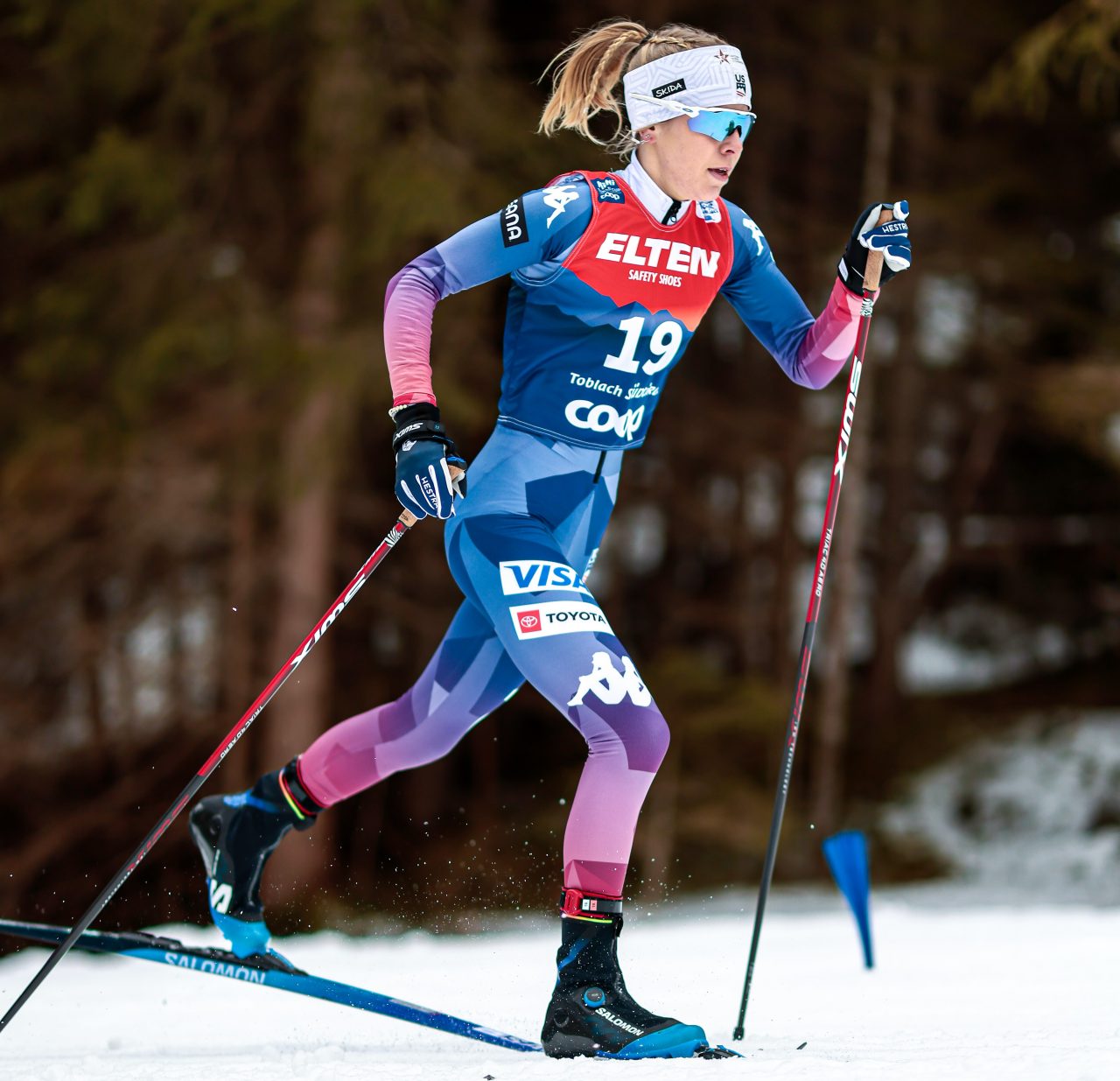
Sophia Laukli: I worked a lot on Classic and I did do a lot of double pole this summer, which certainly improved my double pole in general, but I think it helped my overall ability, Skating, and Classic. Next year, I would like to dial in a bit more Classic. It’s a bummer just to think about Skate races an entire season. I’m obviously never going to be thinking about Sprinting, but if I can focus on every distance race, that is really the goal. Focusing a bit more on Classic technique will be a big thing for the summer. I just started working with my new team and coach with Aker Daehlie this summer, and I’m sure that there will be some changes.
FasterSkier: You just made an interesting comment about Sprints, and how that’s not a strength. Do you think that you have room to improve in the Sprints or are you kind of at your physiological limit as a sprinter?
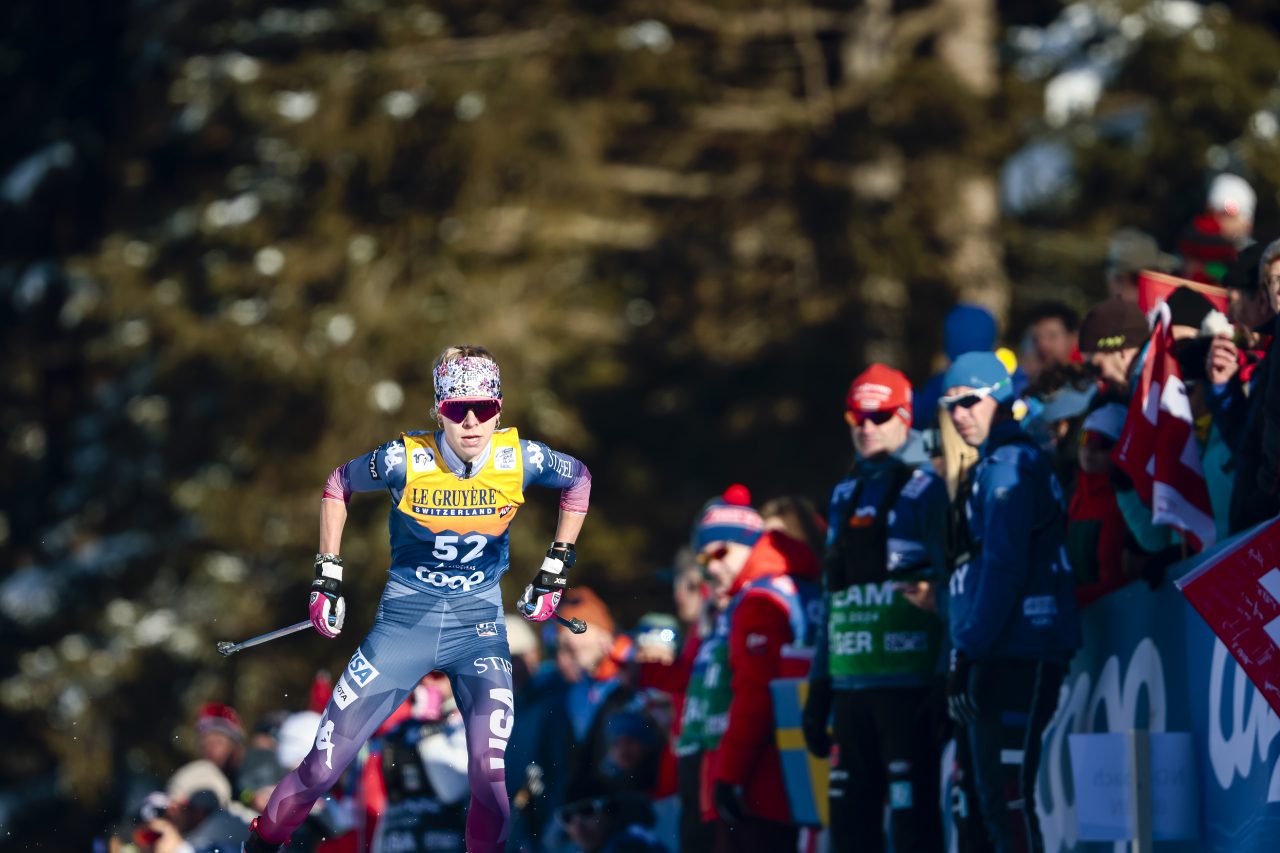
Sophia Laukli: I think it’s a combination. It is possible for me to get slightly better because I am probably held back a little bit physiologically. There are plenty of people that work on it and get better and are maybe never going to be the top. But they can totally be in the mix. I think for me it’s almost like a mental thing. I’ve just completely given up, and so that doesn’t help me get any better at them. I do essentially two Sprints a year, and those days I have zero nerves. I don’t even think of it really as a race, and I’m sure I go even slower because I put no effort into it. But it’s a balance where I think it would be nice to get a little bit better, but I don’t necessarily have the motivation to. This year though, I was realizing, ‘Oh, it would be kind of fun to do the Tour and actually put more into the overall Tour standing.’ I don’t have to be doing super well in the Sprints, but just having a slight improvement could go a far way.
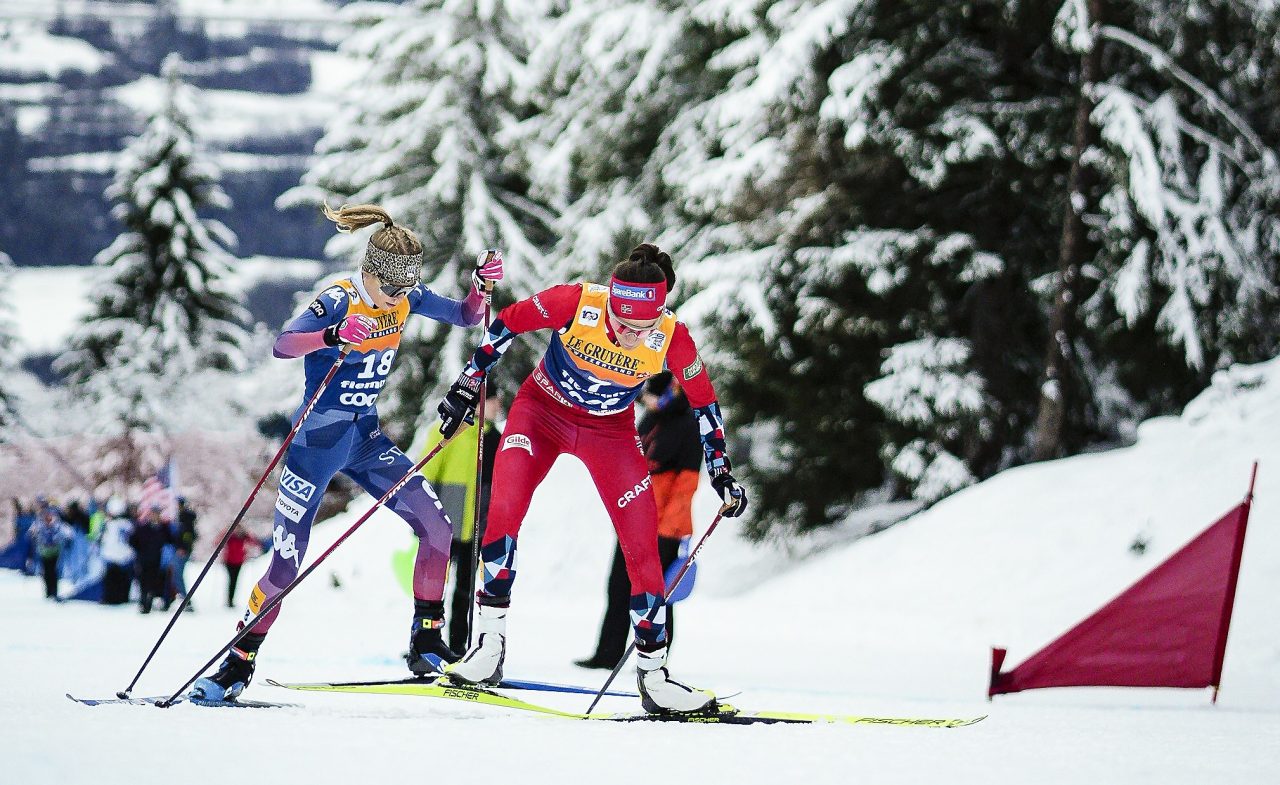
FasterSkier: Let’s focus on something that you really like, and something that you’re obviously really good at; that was the climb up Alpe Cermis. When you crossed the finish line you looked like you could just keep on going. Did you feel that way?
Laukli: Honestly, this is the first race and the first time going up the hill where I finished and I was like, ‘Oh, that should have probably been harder.’ I definitely thought very tactically about it and was just going to stay with whoever was leading and hope to be able to keep up with them. As I was following Heidi Weng (NOR), I felt like I probably could have gone faster, but at the same time I was worried; you see so many people blow up. I’ve done it [Alpe Cermis] twice now, but I still was still a little bit unsure of where it finished. So, I just decided to stay behind until I really knew that I could make a move. I think I waited till 400 meters, and I was ‘OK, I’m not going to blow up.’ But when I got to the finish, I realized that I could have probably made a move quite a bit earlier. I don’t really regret it. This is the one race in the year where I typically actually need to lie down at the finish line and when I got there, after the race, I was a bit shocked that I didn’t need to lie down.
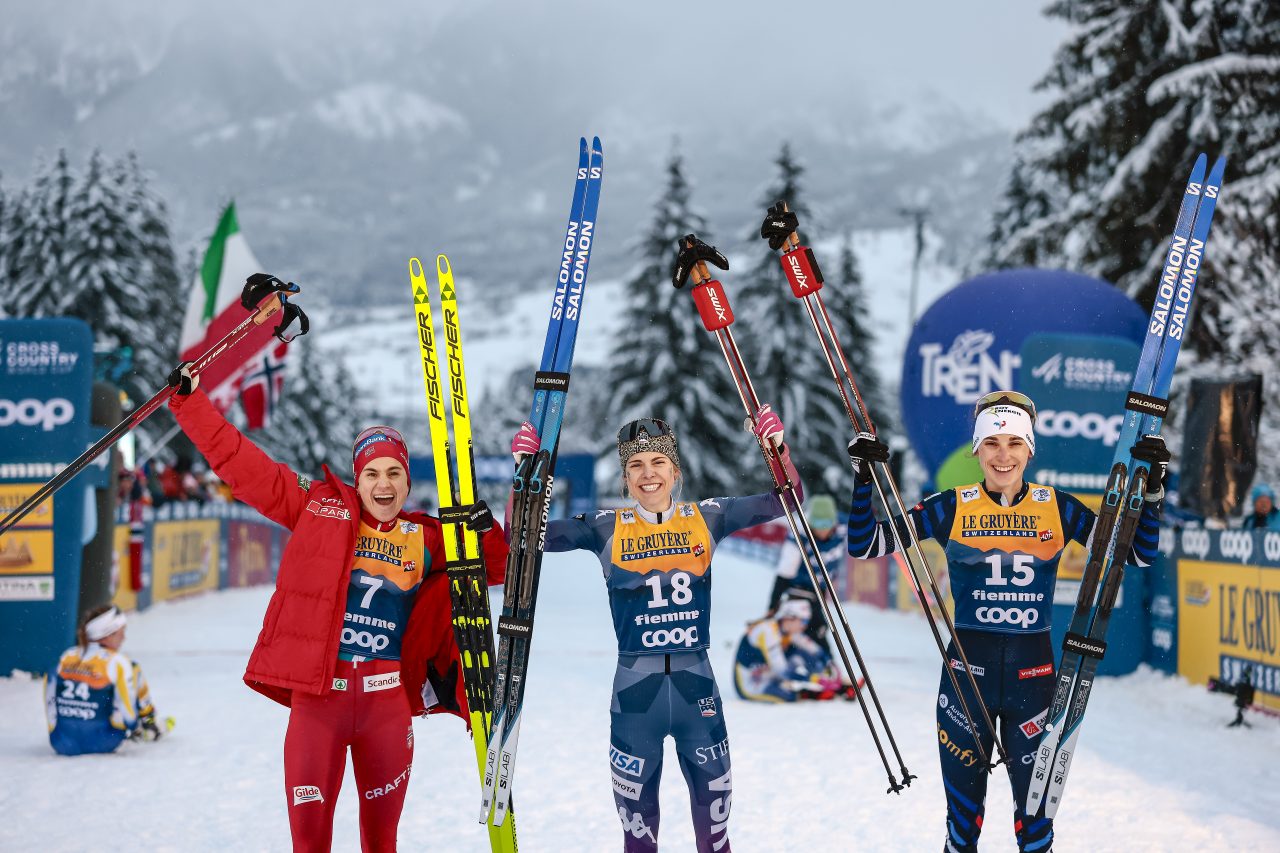
FasterSkier: It sounds like you think you could have won by an even wider margin if you had either broken away from Heidi earlier or just set your own pace the entire way?
Sophia Laukli: I think potentially. But it’s also hard to say. Maybe if I had sent it earlier, I would have blown up a bit and then lost a lot of time. But I think it was a bit conservative of an effort, but with that type of race, especially when I’m not really fighting for an overall position, the time doesn’t matter. I was more just thinking about winning the stage and so being just a little bit cautious probably pays off.
FasterSkier: Before the climb, you probably had a sense that Heidi was going to make a charge, but your plan sounds like regardless of who was in the lead, that you were just going to mark them the entire way and go by them at the finish; let them set the pace and then use your long distance abilities to charge past them?
Sophia Laukli: I was definitely anticipating either Heidi or Delphine [Claudel] to make a move. If no one was really making a move, or there was still a big pack, I would have maybe tried to do my own attack, but it worked out pretty great that Heidi made a move and then no one else followed besides me. It just couldn’t have worked more perfectly to my benefit. The goal was to do as little effort as possible until the very end. So that worked.
FasterSkier: I’m wondering if you had any feeling at all of not wanting to get ahead of Heidi and pull her along and help her put time into Jessie Diggins?
Sophia Laukli: To be honest, I didn’t. Going into the last stage, I was very much under the impression that Jessie just pretty much had it, no problem. And so, it wasn’t until after the race that I realized that really benefited her [Diggins, by not pushing the pace too much]. And so that was kind of cool. But no, I honestly wasn’t intentionally doing that throughout the race.
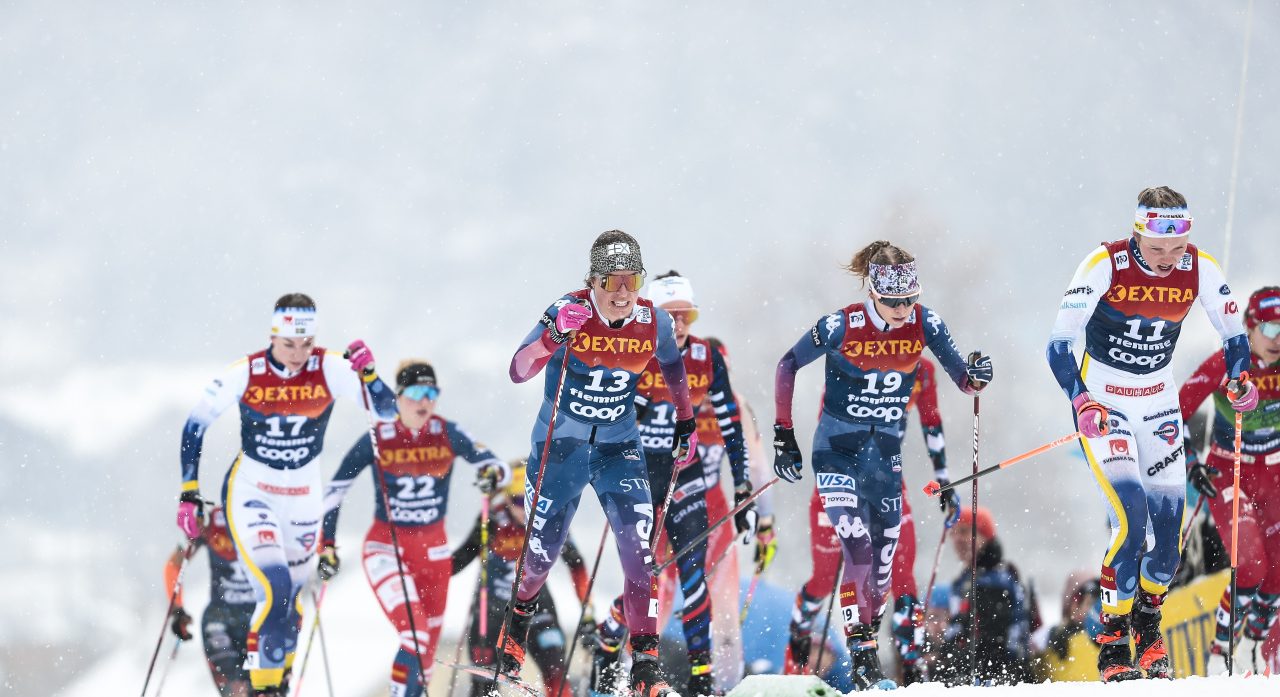
FasterSkier: You had a little stumble about 3/4 of the way up the climb. It looked like you either tripped over your own ski or pole?
Sophia Laukli: I straddled the gate— went on the other side of the gate . . . I was stressed after the fall because I was actually thinking about it, ‘Don’t put your ski on the other side and don’t straddle that [gate]. That would be dumb.’ And then of course I did.
FasterSkier: Did that take much out of you, between the fall and then having to catch back up with Heidi?
Sophia Laukli: Initially I was a little bit panicked in the moment because, a lot of times it seems like a little bit of a gap opens up on the hill; you just can’t catch back up. But I think that was where I realized that I had probably the most energy out there and I just threw in a little bit of a sprint to catch up to Heidi. I was like, ‘Oh, this is actually going to be OK, because I think her pace is fine for me.’
FasterSkier: You regained the ground in just a matter of a couple of seconds, which was really impressive. That’s why I was wondering how much that took out of you?
Sophia Laukli: I was definitely worried in the moment, but as soon as I did make it up, that was when I realized oh, maybe I’m feeling better than her because I don’t feel that I wasted any energy and now, I can just sit in behind. No matter what, it’s always worth putting in a little extra energy to catch up to someone, and then let them do the rest of the work.
FasterSkier: We still have a lot of the World Cup season left, but now that the Tour is behind you, I wonder if it’s given you any additional perspective on how your trail running career has affected your performance so far; either positively or negatively?
Sophia Laukli: So far, I’ve been pleasantly surprised. I don’t know if I can pinpoint that it’s benefited my skiing because I have had way more success this year in general. I’m attributing it mostly just to my summer training for skiing. I was definitely worried, especially just after period one, because period one was quite good for me; anticipating maybe now is when I’m burned out? So, I think having the end of the Tour go that well … I don’t know if it’s the running that helped me? I think probably the all the super long efforts from running allowed me to have quite a bit of energy at the end of the Tour and that’s probably why I had such a good last day. I probably had more energy that day than some of the very first days, which is not the case for most others. When I’m doing those three to four hour long efforts in the summer, I’m sure that plays into the mix for something like the Tour. I think this is the first season where I’ll really be able to figure out how much I can do and if I can sustain a whole ski season right after running season. Obviously, I don’t want to jinx it, but it is exciting for me to see that for at least half of the season, I’m able to continue.
FasterSkier: So, you don’t feel like it’s affected your strength negatively?
Sophia Laukli: No. I don’t think I could say that there’s been really any negatives from the running.
FasterSkier: There are several long races coming up in the second half of the season. There’s Holmenkollen, but that’s a Classic this year.
Sophia Laukli: Yeah, so that’ll be interesting (laughing).
FasterSkier: Holmenkollen, being the distance that would be prime for you but in the technique that isn’t your favorite; you have to kind of be looking at that with a little bit of mixed emotion right now?
Sophia Laukli: Oh definitely. I was pretty devastated to miss it last year, with NCAAs, because it was skate. And I justified that by saying I’ll have several opportunities, but at this point I honestly don’t know the next time it will be a skate because the World Champs and Olympics always mess with that. But that is why I am motivated to get better at Classics so that I can get just as excited for that race.
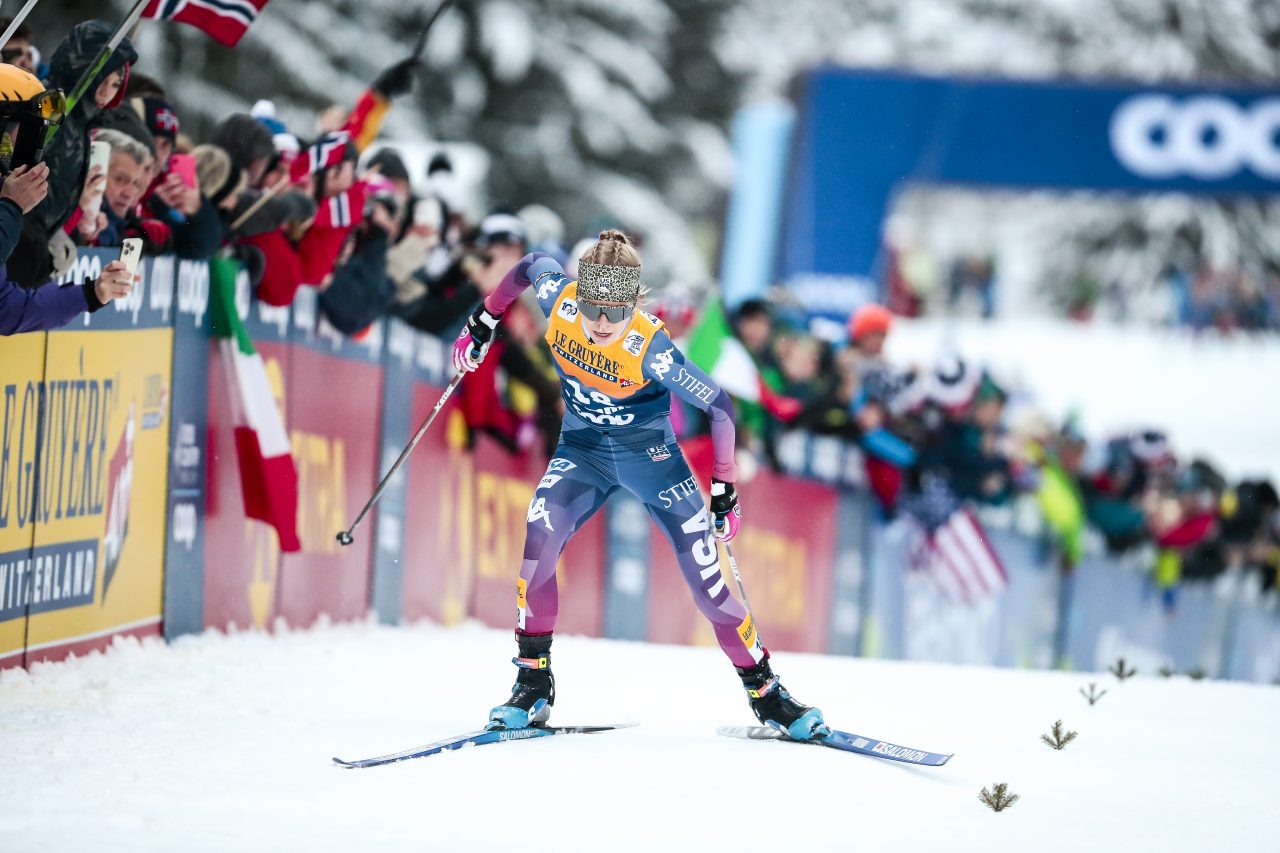
FasterSkier: Since you mentioned other Championships affecting the Skate/Classic schedule for Holmenkollen, I’m wondering if you have any thoughts, given how many people dropped out of this year’s Tour; is the Tour something that should be done in Olympic and World championship years?
Sophia Laukli: I haven’t thought too much about it, but I think it is a little bit scary for someone that is very much a medal contender and this year in particular, it seemed really, really bad. I think you saw Therese Johaug in the last Olympics, she skipped it. I’m feeling that they’re never going to take [the Tour de Ski] away, but I have a feeling in 2026 there may be very, very few participants. I think for me that amount of racing is not what makes me sick. It is interesting why the Tour correlates with so much sickness. I think this year in particular there’s just been way more sickness in general. I don’t know why it’s delayed like that, but I know personally, the Tour makes me tired, but I’m just as likely to get sick in period one. I think there must be a lot of the top skiers considering it not being worth it. Trying to find a balance [is difficult] because you see some of the people that are in the overall [cup] and then they miss the Tour and then they’re kind of giving up the overall position at the end of the World Cup. It’s a little bit scary to miss World Cups, at the same time, even though it might also make you sick and miss more. The whole new like point system and everything else makes a lot of conflicting decisions for sure.
FasterSkier: Is skipping the Tour a point of conversation that comes up amongst skiers?
Sophia Laukli: I think maybe; yeah. Not this year, but I do remember that conversation before Beijing, and I think a lot of people see it that way, but a lot of people see it that racing that much can really put you in good racing shape in a couple of weeks after and, that’s how I look at it. It puts me in better racing shape for period three and period four. And I’m also someone that for better and for worse doesn’t put too much stress on getting sick. I think this whole year there’s a wide range of masking and being very, very adamant about it, or very cautious about sickness, and I’m on the lower end of that. And so I’m never someone to put that as my decision whether to race or not, and obviously when I got sick right at the end of period one, it was, ‘Yep, I probably deserved that, because I haven’t been so careful,’ but I guess that’s why when it comes to next year and the year after, when there are Championships; I don’t worry enough to want to bail on the Tour, at least as of now.
FasterSkier: Well, I appreciate you taking time out of your day to give me a call. Thanks again for taking so much time. You’re going to stay in Oslo until racing starts again?
Sophia Laukli: Exactly. Thank you.



